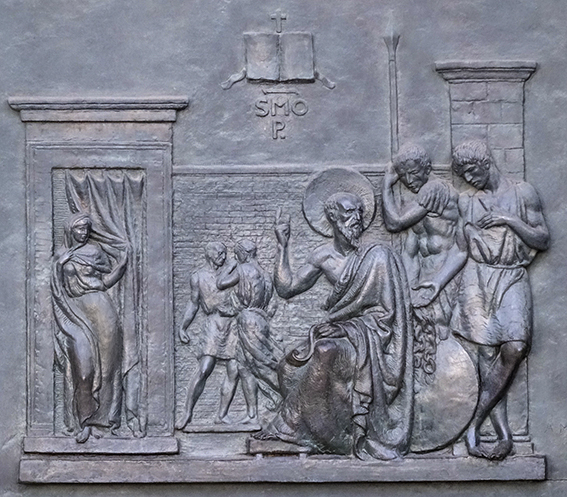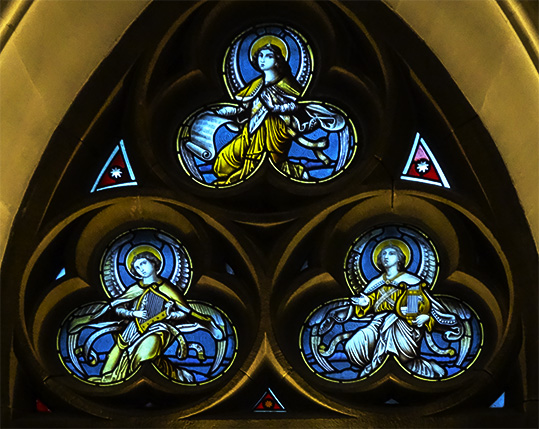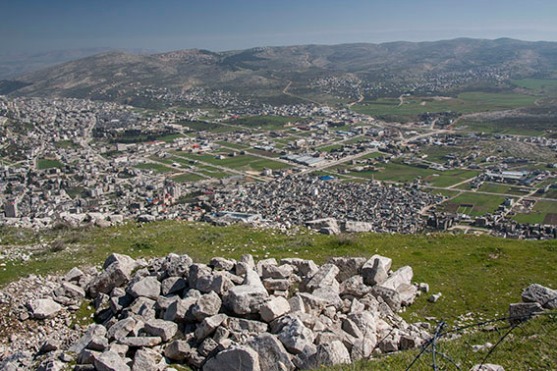 The gospel reading for the 5th Sunday of Lent, Year B, comes from the Gospel of John, and includes both affirmation of Jesus being Son of God, and anticipation of his death.
The gospel reading for the 5th Sunday of Lent, Year B, comes from the Gospel of John, and includes both affirmation of Jesus being Son of God, and anticipation of his death.
On this Sunday if the third scrutiny is being celebrated the gospel reading for Year A – the raising of Lazarus – must be used. It appears at the end of this post. The Year A cycle is an alternative which may be used this Sunday, even when the scrutiny is not celebrated, should there be reason to use it.
Among those who went up to worship at the festival were some Greeks. These approached Philip, who came from Bethsaida in Galilee, and put this request to him, ‘Sir, we should like to see Jesus.’ Philip went to tell Andrew, and Andrew and Philip together went to tell Jesus. Jesus replied to them:
‘Now the hour has come
for the Son of Man to be glorified.
I tell you, most solemnly,
unless a wheat grain falls on the ground and dies,
it remains only a single grain;
but if it dies,
it yields a rich harvest.
Anyone who loves his life loses it;
anyone who hates his life in this world
will keep it for the eternal life.
If a man serves me, he must follow me,
wherever I am, my servant will be there too.
If anyone serves me, my Father will honour him.
Now my soul is troubled.
What shall I say:
Father, save me from this hour?
But it was for this very reason that I have come to this hour.
Father, glorify your name!’
A voice came from heaven, ‘I have glorified it, and I will glorify it again.’ People standing by, who heard this, said it was a clap of thunder; others said, ‘It was an angel speaking to him.’ Jesus answered, ‘It was not for my sake that this voice came, but for yours.
‘Now sentence is being passed on this world;
now the prince of this world is to be overthrown.
And when I am lifted up from the earth,
I shall draw all men to myself.’
By these words he indicated the kind of death he would die.
John 12:20-33
In the death of Jesus we are helped to new life. His dying bears much fruit, and the faithful – and the yet to be faithful – are part of that harvest. We have much to be grateful for.
At the beginning of the Gospel passage ‘some Greeks’ want to ‘see’ Jesus.
John is somewhat suspicious of just ‘sight, and ‘signs’. These externals can be entertainment, spectacle only. They do not necessarily lead us anywhere.
With Jesus there inevitably are signs and sights, but what is more important is the innerness of Jesus, and our developing, deepening relationship with him.
Sent by the Greeks, the disciples not only see but meet Jesus and are privileged with a disclosure of his inner life and it’s meaning, for him and for us. The passage also includes a further disclosure of Jesus’ relationship with his Father.
It may be odd, but John does not tell us whether the Greeks get to see Jesus, let alone to meet him. 2000 years on, it’s perhaps not so important. What is, is whether or not we meet and grow in relationship with him.
We are offered precious and intimate access to Jesus, both in this passage and still more in the liturgies and devotions of Holy Week. They are opportunities to walk, talk and rest with him. Let us resolve today to make the most of them.
And maybe to prepare, today, by finding time to pause and ponder more the scripture passage just read.
What in particular struck us? How? Why? Stay with the sentence, phrase, word: let it speak, let it quieten the world around you so you might hear more clearly what the Lord says to you in and through it?
At the end of your time of meditation consider what you have learnt. Consider your reaction to that, and let that help you prepare a prayer of intercession and thanksgiving to the living and loving Lord.
Photograph of interior of Coptic Church, Egypt. (c) 2004, Allen Morris. Please pray for the Christian communities of Egypt. Much challenged by persecution and violence, may faith flourish in them for their good and the good of their nation.
– – –
There was a man named Lazarus who lived in the village of Bethany with the two sisters, Mary and Martha, and he was ill. It was the same Mary, the sister of the sick man Lazarus, who anointed the Lord with ointment and wiped his feet with her hair. The sisters sent this message to Jesus, ‘Lord, the man you love is ill.’ On receiving the message, Jesus said, ‘This sickness will end not in death but in God’s glory, and through it the Son of God will be glorified.’
Jesus loved Martha and her sister and Lazarus, yet when he heard that Lazarus was ill he stayed where he was for two more days before saying to the disciples, ‘Let us go to Judaea.’ The disciples said, ‘Rabbi, it is not long since the Jews wanted to stone you; are you going back again?’ Jesus replied:
‘Are there not twelve hours in the day?
A man can walk in the daytime without stumbling
because he has the light of this world to see by;
but if he walks at night he stumbles,
because there is no light to guide him.’
He said that and then added, ‘Our friend Lazarus is resting, I am going to wake him.’ The disciples said to him, ‘Lord, if he is able to rest he is sure to get better.’ The phrase Jesus used referred to the death of Lazarus, but they thought that by ‘rest’ he meant ‘sleep’, so Jesus put it plainly, ‘Lazarus is dead; and for your sake I am glad I was not there because now you will believe. But let us go to him.’ Then Thomas – known as the Twin – said to the other disciples, ‘Let us go too, and die with him.’
On arriving, Jesus found that Lazarus had been in the tomb for four days already. Bethany is only about two miles from Jerusalem, and many Jews had come to Martha and Mary to sympathise with them over their brother. When Martha heard that Jesus had come she went to meet him. Mary remained sitting in the house. Martha said to Jesus, ‘If you had been here, my brother would not have died, but I know that, even now, whatever you ask of God, he will grant you.’ ‘Your brother’ said Jesus to her ‘will rise again.’ Martha said, ‘I know he will rise again at the resurrection on the last day.’ Jesus said:
‘I am the resurrection and the life.
If anyone believes in me, even though he dies he will live,
and whoever lives and believes in me will never die.
Do you believe this?’
‘Yes, Lord,’ she said ‘I believe that you are the Christ, the Son of God, the one who was to come into this world.’
When she had said this, she went and called her sister Mary, saying in a low voice, ‘The Master is here and wants to see you.’ Hearing this, Mary got up quickly and went to him. Jesus had not yet come into the village; he was still at the place where Martha had met him. When the Jews who were in the house sympathising with Mary saw her get up so quickly and go out, they followed her, thinking that she was going to the tomb to weep there.
Mary went to Jesus, and as soon as she saw him she threw herself at his feet, saying, ‘Lord, if you had been here, my brother would not have died.’ At the sight of her tears, and those of the Jews who followed her, Jesus said in great distress, with a sigh that came straight from the heart, ‘Where have you put him?’ They said, ‘Lord, come and see.’ Jesus wept; and the Jews said, ‘See how much he loved him!’ But there were some who remarked, ‘He opened the eyes of the blind man, could he not have prevented this man’s death?’
Still sighing, Jesus reached the tomb: it was a cave with a stone to close the opening. Jesus said, ‘Take the stone away.’ Martha said to him, ‘Lord, by now he will smell; this is the fourth day.’ Jesus replied, ‘Have I not told you that if you believe you will see the glory of God?’ So they took away the stone. Then Jesus lifted up his eyes and said:
‘Father, I thank you for hearing my prayer.
I knew indeed that you always hear me,
but I speak for the sake of all these who stand round me,
so that they may believe it was you who sent me.’
When he had said this, he cried in a loud voice, ‘Lazarus, here! Come out!’ The dead man came out, his feet and hands bound with bands of stuff and a cloth round his face. Jesus said to them, ‘Unbind him, let him go free.’
Many of the Jews who had come to visit Mary and had seen what he did believed in him.
John 11:1-45





